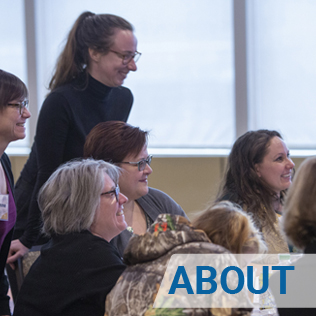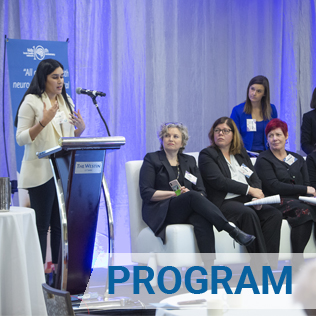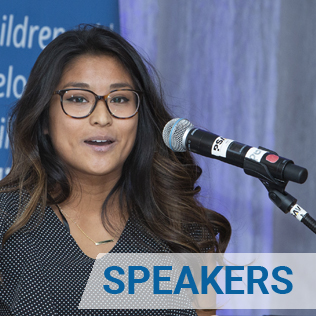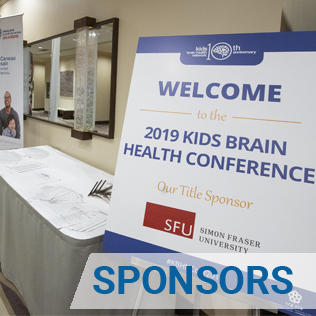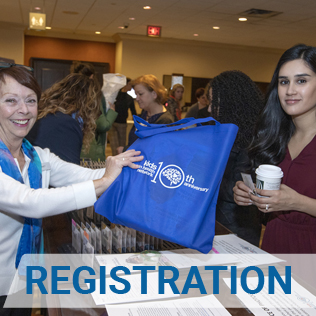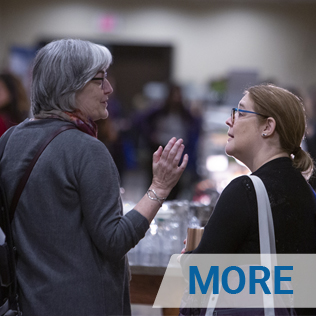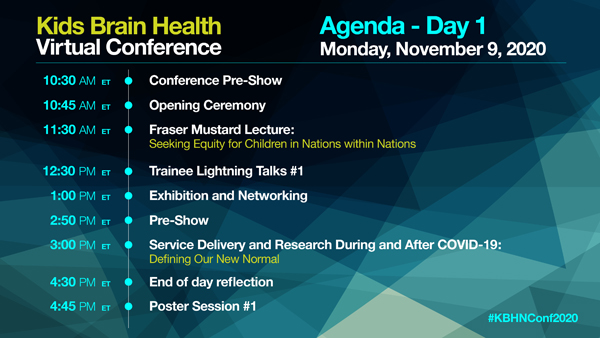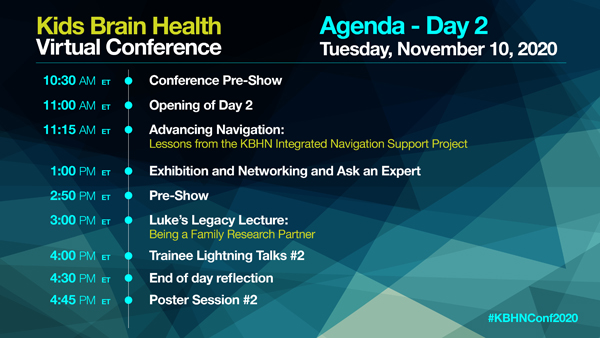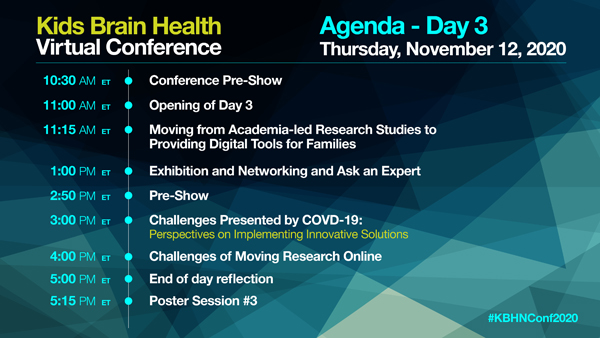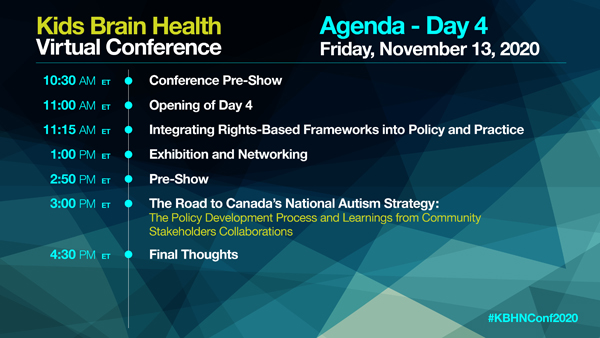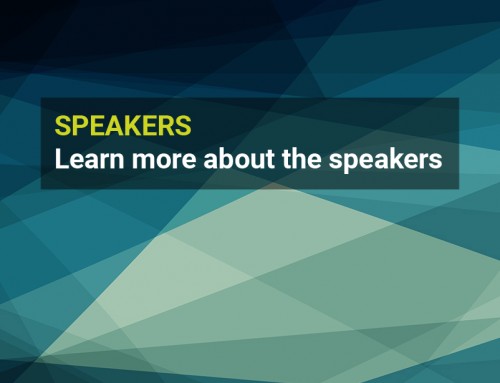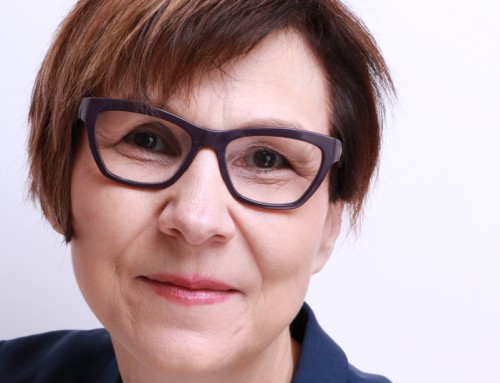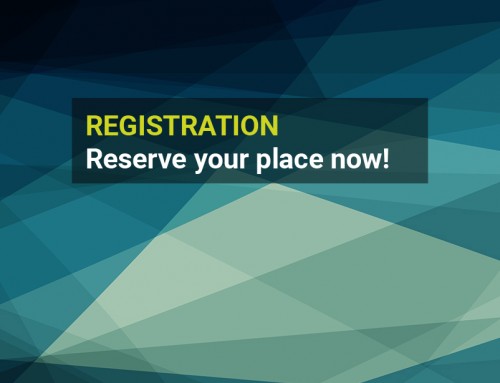FULL PROGRAM
Join KBHN Chief Executive Officer, Nicola Lewis, and Chief Scientific Officer, Dr. James Reynolds in the opening of the first ever Kids Brain Health Virtual Conference. With the participation of the Hon. Minister Carla Qualtrough, Elder Syexwaliya (Ann Whonnock), the Hon. Sen. Jim Munson, KBHN Board Chair, David Kuik and Research and International (pro tem) of Simon Fraser University, Dr. Dugan O’Neil.
Time: 10:45 AM EST – 11:30 AM EST
Speakers:
- Nicola Lewis (Chief Executive Officer, Kids Brain Health Network)
- Dr. James Reynolds (Chief Scientific Officer, Kids Brain Health Network)
- Hon. Minister Carla Qualtrough (Minister of Employment, Workforce Development and Disability Inclusion, Government of Canada)
- Syexwaliya (Ann Whonnock) (Elder, Squamish Nation)
- Hon. Sen. Jim Munson (Senator, Senate of Canada)
- David Kuik (Board Chair, Kids Brain Health Network)
- Dr. Dugan O’Neil (Vice President, Research and International (pro tem), Simon Fraser University)
This presentation describes how systemic state-based discrimination undermines the success of First Nations children in Canada and in North America more broadly. Legal and public education and engagement efforts to promote culturally based equity are discussed.
Time: 11:30 AM EST – 12:30 PM EST
Chair: Dr. Jennifer Zwicker (Deputy Scientific Officer, Kids Brain Health Network & Director of Health Policy at the School of Public Policy, University of Calgary)
Speaker: Dr. Cindy Blackstock, OC FRSC, (Executive Director, First Nations Child & Family Caring Society of Canada & Professor of Social Work, McGill University)
Lightning talks are concise presentations that highlight key research findings and/or knowledge mobilization activities and how they impact the neurodevelopmental disability community. Presentations were selected from trainee and community member abstracts to illuminate the breadth and exciting work of teams across our research and support communities. During these sessions, trainees and community advocates will take the “stage” to showcase their cutting-edge work and stimulate discussion.
Time: 12:30 PM EST – 1:00 PM EST
Chair: Dr. Jill Zwicker (Associate Professor, University of British Columbia)
Speakers:
- Dr. Samantha Micsinszki (Registered Nurse, McMaster University)
- Christopher De Groot (Research Coordinator, BC Children’s Hospital)
- Erin Klein (Master’s Student, University of British Columbia)
- Preeti Kar (Doctoral Student, University of Calgary)
Time: 1:00 PM EST – 2:50 PM EST
Moderator: Dr. Douglas Swanson (Research & Trainee Manager, Kids Brain Health Network)
This panel will bring together experts to provide diverse perspectives on how COVID-19 has shaped the future of service delivery for children with NDDs and their families. This session will examine the challenges faced, lessons learned, innovative approaches developed, and how we move forward from here.
Time: 3:00 PM EST – 4:30 PM EST
Chair: Dr. James Reynolds (Chief Scientific Officer, Kids Brain Health Network)
Speakers:
- Dr. Jessica Brian (Clinician Investigator, Holland Bloorview)
- Dr. Chaya Kulkarni (Director, Infant Mental Health Promotion , Hospital for Sick Children)
- Dr. Brian N. Katz (Vice President, Child and Youth Services, The Centre for Child Development)
- Alex Munter (President & Chief Executive Officer, Children’s Hospital of Eastern Ontario)
- Tracy Moisan (Marketing and Communications Leader, Adopt4Life – Ontario’s Adoptive Parents Association)
Time: 4:30 PM EST – 4:40 PM EST
Master of Ceremony: Dr. Brian Goldman (ER Medical Doctor & CBC Host, Canadian Broadcasting Corporation)
The poster session(s) will take place in a virtual networking environment (hosted on the gather.town platform; Check it out here). Presenters will have prepared a short poster walkthrough video that attendees should view prior to the poster session, piquing viewer interest and preparing for a deeper discussion of their work during the “live” poster sessions. During each virtual poster session, poster presenters will be assigned a time to “stand” by their poster and share research results, community engagement activities, and knowledge mobilization initiatives. Interested attendees are invited to visit the virtual KBHN2020 Networking space and the Virtual Poster Session “room”, where they can interact with presenters (via audio, webcam, and chat), ask questions and explore their posters together with other attendees.
Time: 4:45 PM EST – 6:15 PM EST
Join Dr. Brian Goldman and the Hon. Sen. Rosemary Moodie as they recap Day 1, highlight what to expect for Day 2 and extend a welcome to all.
Time: 11:00 AM EST – 11:15 AM EST
Master of Ceremony: Dr. Brian Goldman (ER Medical Doctor & CBC Host, Canadian Broadcasting Corporation)
Speakers: Hon. Sen. Rosemary Moodie (Senator, Senate of Canada)
A framework for advancing navigation will be presented and project leaders from British Columbia, Alberta, and the Yukon, will describe how navigation has been addressed in their respective jurisdictions. Participants will be invited to engage in case-based learning and to reflect on opportunities in their own regions.
Time: 11:15 AM EST – 12:45 PM EST
Moderator: Dr. Wendy Mitchell (Research Project Manager, University of Calgary)
Speakers:
- Dr. Melissa Dobson (Associate Chair & Instructor, Northern Alberta Institute of Technology)
- Dr. Michèle L. Hébert (Postdoctoral Associate, University of Calgary)
- Dr. Anton Miller (Clinical Associate Professor,BC Children’s Hospital)
- Dulcie Mercado (Autism Support and Resource Specialist, Autism Information Services British Columbia)
- Angela Clancy (Executive Director, Family Support Institute of BC)
- Sandy Litman (Project Lead, KBHN Navigation Alberta, Alberta Health Services)
- Wenda Bradley (Executive Director, Fetal Alcohol Syndrome Society of Yukon (FASSY))
- Dr. David Nicholas(Professor, University of Calgary)
- Dr. Lucyna Lach (Associate Professor, McGill University)
Time: 1:00 PM EST – 2:00 PM EST
Pursuing academia-related careers
This session includes two experts, Dr. Melanie Noel and Dr. Ryan Stevenson, who will discuss their experiences with pursuing careers within academia. They will provide an overview of their own career journeys and highlight tips and key learnings regarding pursuing academia-related careers. This will be an informal session comprising a Q&A session to allow table attendees to ask key questions to support their own career journeys and professional development paths.
Presenters:
-
- Dr. Melanie Noel (Professor, University of Calgary)
- Dr. Ryan Stevenson (Assistant Professor, Western University)
This session will provide an overview of skills and other benefits a doctoral degree can provide when pursuing industry-related careers; it will acknowledge some of the reasons for moving away from a traditional career in academia; and it will provide an overview of some of the opportunities in conducting operational research outside an academic setting. Dr. Chaplin will share her experience navigating the academic path with the intent of advancing her career in public health practice. She will share examples of how operational work in public health benefits from evaluation and research. There will be an informal Q&A component to this session. Dr. Shafai will share her experience of leaving academia with the goal of moving into knowledge translation via working with a nationwide network. She will also discuss how the work in agencies is improved when content-matter experts are engaged in the creation of resources.
Presenters:
-
- Dr. Andrea Chaplin (Evaluation Specialist at Public Health Ontario in the Research, Evaluation and Continuous Quality Improvement Support Unit)
- Dr. Fakhri Shafai (Research and Evaluation Project Coordinator, AIDE Canada)
Have you decided on a specific career path? Are you still considering different options (are you even aware of what those options are)? Whatever success looks like for you, let’s talk about the things you can be doing now to increase your chances of achieving your goals.
Presenter: Dr. James Reynolds (Chief Scientific Officer, Kids Brain Health Network)
Most researchers spend their time focused on developing and testing the effectiveness of new interventions, only to find out too late that implementing their new interventions into practice settings is not an easy or passive task. We will discuss why it is important to consider issues of implementation early on in intervention development, what elements are important, and how to take implementation into account in a way that is practical and structured. Come with questions about implementing change, or simply to learn from the discussion.
Presenter: Dr. Melanie Barwick (Senior Scientist, SickKids’ Research Institute and the Centre for Global Child Health)
Time: 1:00 PM EST – 2:50 PM EST
Moderator: Dr. Douglas Swanson (Research & Trainee Manager, Kids Brain Health Network)
In this panel presentation, family graduates from the KBHN/CanChild/McMaster University Family Engagement in Research (FER) Course will share their experiences in the course and the impact it has had on their involvement as family research partners across the country. They will share their perceptions on how to conduct meaningful family engagement and describe ways in which project partnership impacts both the family and research communities. This session will be co-moderated by Donna Thomson and Connie Putterman (co-developers and co-instructors of the FER course).
Luke’s Legacy Lecture is a memorial tribute to the life of Luke Martens (August 26 2006 – August 9 2020). The son of Rachel and Nick Martens, Luke was a boy who inspired authenticity and excellence in family engagement in research. His tenacity and love of life reminds us of why we seek answers to childhood disability challenges in science, together.
Time: 3:00 PM EST – 4:00 PM EST
Moderators:
- Donna Thomson (Parent Advocate, Author)
- Connie Putterman (Founder, Parent Advocate, The Canada/Israel Autism Research Initiative)
Speakers:
- Rachel Martens (Family Engagement Facilitator, CanCHILD)
- Alison Martens (Administrative Assistant, Alberta Health Services)
- Jaime Lougheed-Winkler (National Coordinator, Cerebral Palsy Canada Network)
- Francine Buchanan (PhD Candidate, University of Toronto)
Lightning talks are concise presentations that highlight key research findings and/or knowledge mobilization activities and how they impact the neurodevelopmental disability community. Presentations were selected from trainee and community member abstracts to illuminate the breadth and exciting work of teams across our research and support communities. During these sessions, trainees and community advocates will take the “stage” to showcase their cutting-edge work and stimulate discussion.
Time: 4:oo PM EST – 4:30 PM EST
Chair: Dr. Jill Zwicker (Associate Professor, University of British Columbia)
Speakers:
- Dércia Materula (Research Associate, University of Calgary)
- Samantha Wong (Research Associate, University of Calgary)
- Flora Roudbarani (Master’s Student, York University)
- Nancy Lockwood (Manager of the Fetal Alcohol Resource Program (FARP), ABLE2)
Time: 4:30 PM EST – 4:40 PM EST
Master of Ceremony: Dr. Brian Goldman (ER Medical Doctor & CBC Host, Canadian Broadcasting Corporation)
The poster session(s) will take place in a virtual networking environment (hosted on the gather.town platform; Check it out here). Presenters will have prepared a short poster walkthrough video that attendees should view prior to the poster session, piquing viewer interest and preparing for a deeper discussion of their work during the “live” poster sessions. During each virtual poster session, poster presenters will be assigned a time to “stand” by their poster and share research results, community engagement activities, and knowledge mobilization initiatives. Interested attendees are invited to visit the virtual KBHN2020 Networking space and the Virtual Poster Session “room”, where they can interact with presenters (via audio, webcam, and chat), ask questions and explore their posters together with other attendees.
Time: 4:45 PM EST – 6:15 EST
Join Dr. Brian Goldman and the Hon. Sen. Colin Deacon as they recap Day 2, highlight what to expect for Day 3 and extend a welcome to all.
Time: 11:00 AM EST – 11:10 AM EST
Master of Ceremony: Dr. Brian Goldman (ER Medical Doctor & CBC Host, Canadian Broadcasting Corporation)
Speaker: Hon. Sen. Colin Deacon (Senator, Senate of Canada)
Digital-based tools such as apps and software have the benefit of being extremely accessible for families of children with NDD. This panel will discuss the challenges and opportunities of bringing the outcomes of academia-led research studies to families of NDD children through industry-academic partnerships.
Time: 11:15 AM EST – 12:45 PM EST
Moderator: Kamaldeep Singh Sembi (Director of Technology Licensing & IP Counsel, Simon Fraser University)
Speakers:
- Dr. Sarah Macoun (Assistant Professor, University of Victoria)
- Dr. Penny Corkum (Professor, Dalhousie University)
- Jim Fit (Founder and Chief Executive Officer, Velsoft)
- Robyn Woods (Founder and Chief Executive Officer, Kids Uncomplicated Inc.)
- Dr. Ryan D’Arcy (President, Chief Scientific Officer & Co-Founder, Health Tech Connex)
- John Sheehan (Graduate Student, University of Victoria)
- Dr. Elizabeth Keys (Post Doctoral Fellow, Dalhousie University)
Closing Thoughts: Dr. Christopher McCabe (Chief Executive Officer & Executive Director, Institute of Health Economics)
Time: 1:00 PM EST – 2:00 PM EST
Presenter: Dr. Brian Goldman (ER Medical Doctor & CBC Host, Canadian Broadcasting Corporation)
Lonnie Zwaigenbaum is a developmental pediatrician whose research focuses on early detection and diagnosis of autism and also formerly directed the national Autism Research Training program. He also chaired the Canadian Pediatric Society Task Force on Autism Assessment that led to the publication of national clinical practice statements. At this table, Dr. Zwaigenbaum would be happy to discuss questions related to autism research, knowledge translation/professional training, and career planning.
Presenter: Dr. Lonnie Zwaigenbaum, MD, FRCP(C) (Director of Autism Research, University of Alberta)
This table includes Dr. Andrea Cross, Donna Thomson, and Connie Putterman – the Family Engagement in Research Course co-developers and co-instructors. Join this table to ask questions related to family/patient engagement in research and to learn about best practices and tips and tricks for meaningfully engaging with families throughout the research process.
Presenters:
-
- Dr. Andrea Cross (Postdoctoral Fellow, CanChild)
- Donna Thomson (Parent Advocate, Author)
- Connie Putterman (Founder, Parent Advocate, The Canada/Israel Autism Research Initiative)
A short presentation with Q&A where the discussion will focus on the need for compassionate care and cultural humility in working with and for the neurodiverse population. Dr. Syed will describe lessons learned in intercultural collaboration, as well as strategies to engage in compassionate, sustainable practices.
Presenter: Dr. Noor Syed (Research Coordinator, Global Autism Project)
Being a member of a collaborative team is essential for outcome success. In this space, participants will learn strategies on why some multidisciplinary teams struggle and gain techniques on how to build an effective team. Through effective communication, value-driven behaviours, and committed actions, participants will leave with practical strategies to compassionately embrace collaboration. This table will begin with a short presentation to introduce and outline a framework that will help visualize this critical topic, followed by a Q&A period.
Presenter: Dr. Jacob A. Sadavoy (Director of Clinical Services, Global Autism Project)
Time: 1:00 p.m. EST – 2:50 PM EST
Moderator: Dr. Douglas Swanson (Research & Trainee Manager, Kids Brain Health Network)
COVID-19 has presented many challenges to both families and organizations in the delivery of supports and services across the sectors of health, education, community and social services. MITACS and Kids Brain Health partnered to create targeted internship opportunities during the COVID-19 pandemic for trainees and researchers to collaborate with community partners to co-create and implement programs of research, intervention, and family support that improves the quality of life and outcomes for children with neurodevelopmental disabilities. This session will share information, perspectives and lessons learned from the research internship perspective and community partner perspectives on how cross-disciplinary research can be used to rapidly generate new knowledge and enhance capacity within community organization to improve outcomes for children living with neurodevelopmental disabilities and their families. Come hear about their experience and share your thoughts on how these type of internship opportunities can be utilized in future work.
Time: 3:00 PM EST – 4:00 PM EST
Moderator: Dr. John Hepburn (CEO & Scientific Director, MITACS)
Speakers:
- Margaret Spoelstra (Executive Director, Autism Ontario)
- Dr. Jonathan Lai (Director of Strategy & Operations, CASDA)
- Heather Lacey (Executive Director, Able2)
- Mezaun Lakha-Evin (Associate Executive Director, Cerebral Palsy Alberta)
- Joanna Nefs (Chief Executive Officer, AIDE Canada)
- Deborah Pugh (Executive Director, ACT – Autism Community Training)
- Dr. Brian N. Katz (Vice President, Child and Youth Services, The Centre for Child Development)
- Dr. Vivian Lee (Investigator, York University)
- Jacalyn Guy (Investigator, Western University)
- Maude Champagne (Doctoral Student, Queen’s University)
- Ashish Seth (Investigator, University of Calgary)
- Jessica Kohek (Investigator, University of Calgary)
- Dr. Wendy Mitchell (Investigator, University of Calgary)
- Rosslynn Zulla (Investigator, University of Calgary)
- Vanessa Fong (Investigator, Simon Fraser University)
- Buse Bedir (Investigator, University of Victoria)
COVID-19 has disrupted studies across Canada and many researchers are struggling to adapt their projects for an online environment. In this session, panelists will give a brief overview of the research occurring in their labs and how they have managed to shift to remote data collection. Additionally, resources and best practices will be discussed to provide the audience with a greater understanding of the factors that need to be taken into consideration as they move forward with research in our post-pandemic reality.
Time: 4:00 PM EST – 5:00 PM EST
Moderator: Dr. Fakhri Shafai (Research & Evaluation Project Coordinator, AIDE Canada)
Speakers:
- Dr. John Paul Minda (Professor, Western University)
- Cailey Salagovic (Graduate Student, Western University)
- Bobby Stojanoski (Post Doctoral Research Fellow, Western University)
- Dr. Kevin Sanders (Global Head of Neurodevelopment, Genentech)
- Dr. Alonso Montoya (Medical Director, Hoffmann-La Roche Limited)
Time: 5:00 PM EST – 5:10 PM EST
Master of Ceremony: Dr. Brian Goldman (ER Medical Doctor & CBC Host, Canadian Broadcasting Corporation)
The poster session(s) will take place in a virtual networking environment (hosted on the gather.town platform; Check it out here). Presenters will have prepared a short poster walkthrough video that attendees should view prior to the poster session, piquing viewer interest and preparing for a deeper discussion of their work during the “live” poster sessions. During each virtual poster session, poster presenters will be assigned a time to “stand” by their poster and share research results, community engagement activities, and knowledge mobilization initiatives. Interested attendees are invited to visit the virtual KBHN2020 Networking space and the Virtual Poster Session “room”, where they can interact with presenters (via audio, webcam, and chat), ask questions and explore their posters together with other attendees.
Time: 5:15 PM EST – 6:45 PM EST
Join Dr. Brian Goldman and the Hon. Mike Lake as they recap Day 3, highlight what to expect for Day 4 and extend a welcome to all.
Time: 11:00 AM EST – 11:10 AM EST
Master of Ceremony: Dr. Brian Goldman (ER Medical Doctor & CBC Host, Canadian Broadcasting Corporation)
Speaker: Hon. Mike Lake (Member of Parliament, Government of Canada)
This panel of policymakers and community stakeholders will discuss considerations and implications of moving rights-based frameworks, such as the United Nations Convention on the Rights of Persons with Disabilities into policy and practice. Questions for this interactive dialogue will focus on experiences integrating rights-based frameworks into policy, applicable learnings from the COVID-19 pandemic, and reflections on key priorities and next-steps to develop policy that facilitates full participation in society.
Time: 11:15 AM EST -12:45 PM EST
Moderators:
- Dr. Jennifer Zwicker (Deputy Scientific Officer, Kids Brain Health Network & Director of Health Policy at the School of Public Policy, University of Calgary)
- Vanessa Tomas (PhD Student, University of Toronto)
Speakers:
- Steve Estey (Human Rights Officer, Disabled Peoples’ International)
- Kerri Joffe (Lawyer, ARCH Disability Law Centre)
- Krista Carr (Executive Vice President, Inclusion Canada)
- Michael Prince (Professor, University of Victoria)
- Rachel Martens (Family Engagement Facilitator, CanCHILD)
- Dr. Keiko Shikako-Thomas (Assistant Professor, McGill University)
Time: 1:00 PM EST – 2:50 PM EST
Moderator: Dr. Douglas Swanson (Research & Trainee Manager, Kids Brain Health Network)
Trainees from the Kids Brain Health Network and Canadian Autism Spectrum Disorder Alliance policy practicum fellowship will reflect on and discuss learnings and findings from the policy development process for Canada’s National Autism Strategy. Trainees will discuss the collaborative process of researching international approaches and engaging with community stakeholders to develop policy recommendations in five key areas to inform Canada’s National Autism Strategy: housing, employment, affordability and access, information, and research and governance. Trainees and working group partners will reflect on the challenges, successes, and lessons learned. Key academic, government, and public health representatives will provide commentary and takeaways on recommendations and opportunities for developing Canada’s National Autism Strategy.
Time: 3:00 PM EST – 4:30 PM EST
Moderators:
- Dr. Jonathan Lai (Director of Strategy & Operations, CASDA)
- Dr. Jennifer Zwicker (Deputy Scientific Officer, Kids Brain Health Network & Director of Health Policy at the School of Public Policy, University of Calgary)
Speakers:
- Daljit Gill-Badesha (Healthy Communities Manager, City of Surrey)
- Dr. Nathalie Garcin (Founder, Clinique Spectrum)
- Brittany Finlay (Research Associate, University of Calgary)
- Brooke Pinsky (Manager of Support Services, Autism Edmonton)
- Vanessa Tomas (PhD Student, University of Toronto)
- Debbie Irish (Chief Operating Officer, Canadian Council on Rehabilitation and Work)
- Carolyn Abel (Policy Fellow, CASDA)
- Jill Farber (Executive Director, Autism Speaks Canada)
- Dr. Stephen Gentles (Postdoctoral CIHR Health System Impact Fellow, McMaster University)
- Leslie Peters (Executive Director, Autism Yukon)
After four days of discussion, collaboration and research sharing, we close #KBHNConf2020 with a few words from MC Dr. Brian Goldman and KBHN Researcher and ASD Clinician Dr. Lonnie Zwaigenbaum.
Time: 4:30 PM EST – 5:10 PM EST
Speakers:
- Dr. Brian Goldman (ER Medical Doctor & CBC Host, Canadian Broadcasting Corporation)
- Dr. Lonnie Zwaigenbaum, MD, FRCP(C) (Director of Autism Aesearch, University of Alberta)
Trainee Lightning Talks
Lightning talks are concise presentations that highlight key research findings and/or knowledge mobilization activities and how they impact the neurodevelopmental disability community. Presentations were selected from trainee and community member abstracts to illuminate the breadth and exciting work of teams across our research and support communities. During these sessions, trainees and community advocates will take the “stage” to showcase their cutting-edge work and stimulate discussion.
Poster Session
The poster session(s) will take place in a virtual networking environment hosted on the gather.town platform. (See the KBHN2020 Networking orientation video). The schedule for the daily poster presentations can be found [here]. Presenters will have prepared a short poster walkthrough video that attendees should view prior to the poster session, piquing viewer interest and preparing for a deeper discussion of their work during the “live” poster sessions. During each virtual poster session, poster presenters will be assigned a time to “stand” by their poster and share research results, community engagement activities, and knowledge mobilization initiatives. Interested attendees are invited to “walk through” the virtual KBHN2020 Networking space and into the Virtual Poster Session “room”, where they can interact with presenters (via audio, webcam, and chat), ask questions and explore their posters together with other attendees.
Ask an Expert
Conference trainees and community members are invited to join us in the KBHN2020 Virtual Networking space for the opportunity to interact virtually with conference dignitaries and other field leaders in small group settings. “Expert” virtual table hosts will guide the discussions and share personal insights into neurodevelopmental research, community engagement, and career development.
Networking Environment
Attendees are invited to explore this KBHN2020 Networking space when not attending the plenary and panel sessions and to explore poster sessions.


